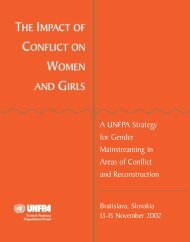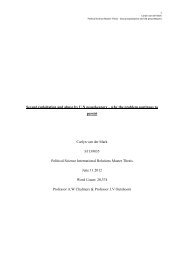Stop Sudah English-revised-March2012 - International Center for ...
Stop Sudah English-revised-March2012 - International Center for ...
Stop Sudah English-revised-March2012 - International Center for ...
You also want an ePaper? Increase the reach of your titles
YUMPU automatically turns print PDFs into web optimized ePapers that Google loves.
TIKI’ – PAPUAN WOMEN’S HUMAN RIGHTS NETWORK<br />
TIKI’ grew from the concern of individuals and<br />
women’s groups about the situation of Papuan<br />
women’s human rights. With assistance from<br />
the <strong>International</strong> <strong>Center</strong> <strong>for</strong> Transitional Justice,<br />
and facilitated by the Women’s Working Group<br />
of the Papua People’s Assembly (MRP) and the<br />
National Women’s Commission, a team of<br />
Papua women documented the situation of<br />
Papuan women’s human rights and published<br />
their findings in a report entitled: Enough is<br />
Enough! Testimonies of Papuan Women Victims of<br />
Violence and Human Rights Violations 1963-2009.<br />
WITH this momentum, a network was <strong>for</strong>med<br />
on 9 October 2010 comprising organizations<br />
and individuals with the goals to:<br />
• increase the understanding of the women’s<br />
movement about the situation of violence<br />
against women in Papua and other violations<br />
of their rights;<br />
• encourage and support the protection,<br />
restoration, and fulfillment of the rights of<br />
Papuan women.<br />
BASED on the report and these goals, this<br />
network was named TIKI’ Papuan Women’s<br />
Human Rights Network.<br />
VISION: Realization of the Advancement,<br />
Protection and Fulfillment of Papuan Women’s<br />
Human Rights.<br />
VALUES:<br />
• hold high human rights’ principles<br />
• side with victims without discrimination<br />
• gender equality and justice.<br />
IN an urgent situation, where we shout,<br />
“Enough is Enough!” we can no longer wait <strong>for</strong><br />
state recognition and policy change. We must<br />
immediately move to strengthen victims,<br />
support healing, and advocate <strong>for</strong> state and<br />
community recognition of victims’ rights.<br />
WEAVING A NOKEN (a traditional Papuan<br />
bag) is the way we describe the healing process<br />
<strong>for</strong> victims. It comprises five steps:<br />
1. Find a Friend: the process of identifying<br />
women victims of violence in a community.<br />
2. Hold Hands: another word <strong>for</strong> the healing<br />
process where victims have space to share<br />
their stories and take steps towards healing.<br />
3. Gather Stories: a process of documenting<br />
testimonies/stories of women victims.<br />
4. Giving Voice: documentation findings are<br />
shared with government, cultural, and<br />
religious leaders, and if possible, victims<br />
willing to speak are given space <strong>for</strong> a public<br />
hearing.<br />
5. Change My World: a process of periodic<br />
support to strengthen victims (socially,<br />
economically, politically)<br />
PROGRAM PRIORITIES:<br />
1. Weaving a Noken has three main activities:<br />
local documentation of violations of<br />
women’s human rights; restoration and<br />
fulfillment of the rights of women victims;<br />
and advocacy <strong>for</strong> policies with a perspective<br />
on women’s human rights.<br />
2. Network Capacity Building whose main<br />
activity is developing the resource capacity<br />
and empowerment of the network.<br />
Consensus also has been reached regarding the<br />
network’s priority issues: eco-social-cultural<br />
rights, reparations, management of natural<br />
resources, rights of women in regions vulnerable<br />
to violence (border, security operations,<br />
extractive industries), women and politics, and<br />
women human rights defenders. Urgent issues<br />
<strong>for</strong> joint advocacy include the issue of women’s<br />
human rights in relation to government policies<br />
(related to institutional re<strong>for</strong>m) and women’s<br />
problems that have a large, systematic, and<br />
widespread impact.<br />
WORKING TEAM<br />
Network Members:<br />
1. Humi Inane –Sound of Women (focus on<br />
domestic violence)<br />
2. United <strong>for</strong> Truth (BUK), Biak<br />
3. Women’s Health Network of Eastern<br />
Indonesia (JKPIT)<br />
4. Belantara Papua (environmentalist group)<br />
5. Merauke Peace & Justice Secretariat (SKP)<br />
6. Institute <strong>for</strong> Research and Empowerment of<br />
Papuan Women and Children (LP3A-P)<br />
ENOUGH IS ENOUGH! 62




![IANSA [PDF, 2MB] - PeaceWomen](https://img.yumpu.com/25206379/1/190x123/iansa-pdf-2mb-peacewomen.jpg?quality=85)
![Commitments Sample [PDF, 93KB] - PeaceWomen](https://img.yumpu.com/25206331/1/190x245/commitments-sample-pdf-93kb-peacewomen.jpg?quality=85)










![A Toolkit for Advocacy and Action [PDF, 260KB] - Peace Women](https://img.yumpu.com/25205989/1/190x245/a-toolkit-for-advocacy-and-action-pdf-260kb-peace-women.jpg?quality=85)